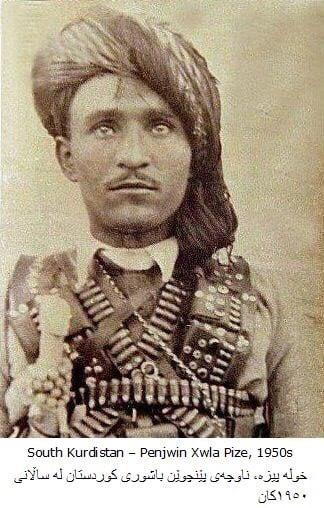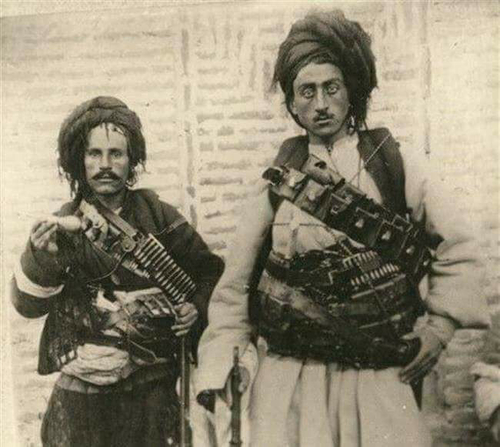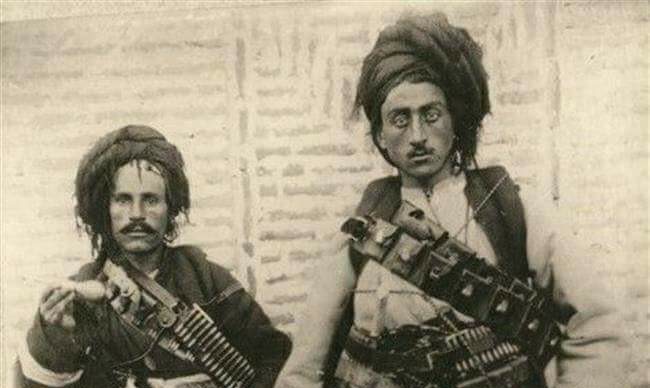Khula Piza and his resistance against social and political injustice is one of those topics that every Kurdish individual from the South and East parts of Kurdistan has heard and discussed in the past century. "Mahmoud" son of "Piroz" Khantoun known as "Khula Piza" is one of the famous names in the history of Kurdistan known to the people of the South and East parts of Kurdistan. This name is mostly a reminder of courage, revolting against tyranny, rebelliousness, and uprising against chaos.
The true history and manners of Khula Piza are scarcely found as a written part of history. What is known from the local sources is that Khula Piza was originally from Chamyala village. In 1945 the chief of police at Walyawa village police station, Mohammad Amin Bani Shari, along with some Arab police officers went to Chamyala village in order to capture some men for obligatory military service. Khula Piza family used to live in Chamyala village at that time. After searching most of the houses in that village, they go to Khula Piza's house to capture his brother, Tahir. However, Tahir was not at home at that time and Khula Piza was resting in bed for his severe sickness. After Mohammad Amin Bani Shari entered their house, Khula Piza's mother asked them to leave and come back another time because Tahir was not home. The police forces, however, want to take Khula instead of Tahir. Mahmoud, being sick, heard his mother's quarrels with the soldiers debating on their leave and return later to take Tahir; she even brought Quraan and swore to it that she would send Tahir herself after he returned home but let Mahmoud or Khula stay.

The police officers disrespected Quraan, pushed his mother away, and threw her to the ground which led to Khula's reaction to take the rifle they had at home and face the soldiers with it. He killed Mohammad Amin Shari Bani, the chief of police, and ran away among the soldiers. However, he asked the villagers to send his brother to Hujra Faqeyan Mountain after he returned to the village. In that fight, Khula killed the chief of the police and eleven soldiers. After Tahir, Khula's brother, went to see Khula, some of the villagers who were tired of the tyranny of the official forces joined Khula and as such Khula, his brother and those men formed their group. They swore to fight to the last drop of their blood against tyranny. Never act unfairly towards anyone. Never plunder anyone's homes. Help out the poor and people under pressure.
Obviously, after Khula Piza was known to all, many people joined his group. The most famous men in that group were "Aziz Toutkani", "Sharif Toutkani's" brother who got killed in the Siyagwez battle; "Faraj Rangini" who got killed in Suleimani after "Tahir Piza" was murdered, "Hamadashi" who was from "Barika" village and got executed, "Mullah Kattan" who was from the East part of Kurdistan and he followed Khula Piza's way, "Maji Awal", "Rahim Mullah Fattah" known as "Rahalal", "Salih Koyi", "Fattah Toutkani", "Mohammad Amin Toutkani", "Ahmad Timari", "Hasa Taqa" who was killed in the fatal battle of Qizilja, "Raha Shera" who was killed in Wena and Daroukhan battle, "Aba Kawlar", "Maja Gurga" and many more. Most of these men were killed with Khula Piza and sometime after him.

After Khula Piza killed the soldiers of that police station in 1948, the Halabja governor went to the Chamyala mountains with a large troop to suppress Khula Piza. An unfair battle began at 5 AM. Khula Piza and his comrades wounded 125 men in the Halabja governor's troop and killed 50 of their men creating an epic victory. After that, this revolutionary group's victory was spread in all the cities and villages of the Southern part of Kurdistan and even the eastern part of Kurdistan. They brought some of their wounded men to Saqqez via Baneh one of whom was "Tahir Piza" who was brought to Saqqez, treated, and transferred to Armirda and Sayranband. These battles continued constantly. Once again in 1948, a large army came to Suleimani from Kirkuk. One thousand soldiers. This time, Khula Piza tried to use the tribe's forces in addition to his men in order to enlarge his group and his movement. He wrote a letter to the Hamawand tribe asking for their cooperation. This tribe accepted his request and joined him with all their men. A fatal was happened between the Kirkuk troop coming through Suleimani way and Khula Piza's followers and the Hamawand tribe. In that battle 260 soldiers of the Kirkuk troop got killed, 380 men got wounded, 60 men of the Hamawand tribe, and 8 men from Khula Piza's men got martyred, too. The war expanded day after day.
Gradually, Khula Piza's battle with the state's forces was reflected in the world's newspapers and radio broadcasts such as Germany, Paris, and Russian radios which made the Iraqi state even more offended. Thus, the Iraqi government sent his representative to negotiate with Khula Piza and reach an agreement. However, the result of the negotiations was not as Khula Piza and his comrades expected. The government's representatives wanted Khula Piza to give up and surrender himself, go to Baghdad, and stay there, instead, they would give them jobs. That is, none of the social demands this group had were accepted. Thus, Khula Piza said that we will not step towards our slaughterhouse blindfolded instead we will keep our revolution. After this negotiation failed, Malik Faysal sent a very large troop including 3000 armed military men from Malik Faysal's army in the Autumn to that region attacking Khula Piza's forces from all corners and in a heavy battle in 1951, Khula Piza got killed. After he was martyred, the battle ended and the people of Suleimani buried Khula Piza and his comrades in a glorious ceremony.








